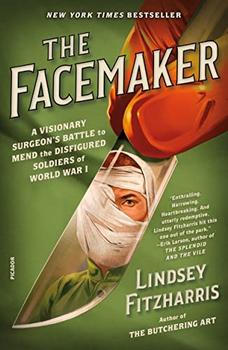Summary | Excerpt | Reviews | Beyond the Book | Readalikes | Genres & Themes | Author Bio

A Visionary Surgeon's Battle to Mend the Disfigured Soldiers of World War I
by Lindsey Fitzharris1
THE BALLERINA'S RUMP
The war and all its horrors were as yet unimaginable as Harold Delf Gillies and his wife wove their way through Covent Garden. Slender, with a beaklike nose and dark brown eyes that often glinted with mischief, the thirty-year-old surgeon had a habit of slouching that made him seem shorter than his five foot nine inches. The couple pushed on through the throng of stallholders and hawkers who were concluding their day's business on the cobbled streets. In the spring of 1913, London was a far more commanding presence in the world than it would be on the cusp of the Second World War, twenty-six years later. With over seven million people living there, this bustling metropolis was larger than the municipalities of Paris, Vienna, and St. Petersburg put together, and it was home to more people than Britain and Ireland's sixteen other largest cities combined.
London wasn't just big. It was also wealthy. The city funneled ships into and out of the North Sea via the Thames as they exported and imported goods from all points of the compass. It was one of the busiest and most prosperous ports in the world, and a vast emporium of luxuries. Dockers unloaded regular shipments of Chinese tea, African ivory, Indian spices, and Jamaican rum. With this influx of goods came people from countless nations, some of whom decided to settle in the capital permanently. As a result, London was more cosmopolitan than ever before.
Londoners worked hard and played harder. There were 6,566 licensed premises that fueled the city's favorite pastime—drinking—and ensured that the police force was kept busy. London boasted 5 football teams, 53 theaters, 51 music halls, and nearly 100 cinemas that would see weekly attendance triple by the end of the decade.
On that unseasonably warm spring evening, the Royal Opera House was staging its first performance of Verdi's Aida for London's more well-to-do music lovers. Gillies had been given tickets by his boss, Sir Milsom Rees, a laryngologist who specialized in illnesses and injuries of the larynx, or voice box. As medical consultant to the Royal Opera House, Rees was charged with tending to the throats of its famous singers. On this occasion, however, he was indisposed, so he sent his young protégé to deputize for him.
Three years earlier, Gillies had acquired his cushy position at Rees's medical practice, situated in the fashionable district of Marylebone, largely by happenstance. When he interviewed for the job, he had just completed his clinical studies at St. Bartholomew's Hospital in London. During that time, he had shown a keen interest in otorhinolaryngology, a surgical subspecialty that deals more broadly with conditions of the head and neck. Those who work in this field more commonly refer to it as ENT (ear, nose, and throat). The chief physician, Walter Langdon-Brown, considered him to be one of the ablest in his class. But it wasn't Gillies's surgical skills that had landed him the job with Rees across town. Rather, it was his reputation as an excellent golfer that had caught the older doctor's attention.
At the time, Gillies had just reached the fifth round of the English Amateur Championship. During the job interview, Rees brought out his own golf clubs for Gillies to inspect. As the laryngologist demonstrated his swing, Gillies grew impatient. "This is ridiculous. When is he going to talk about the job?" he wondered. As it turned out, they never did find a chance to discuss the terms of employment. A short way into the interview, a patient arrived, prompting Rees to rush a bewildered Gillies from his office. Just as he was closing the door, Rees briefly swung his attention back to his would-be employee and offhandedly remarked, "Oh, my dear fellow, I'd forgotten! Well, how would five hundred [pounds] a year suit you? Any private patients you pick up you can keep for yourself. All right?" Gillies—who had been making fifty pounds a year at the hospital—was elated at the prospect of making ten times as much money as an ENT specialist in Rees's private practice. It was not the last time that admiration for Gillies's sporting prowess would open the door to opportunity.
Excerpted from The Facemaker by Lindsey Fitzharris. Copyright © 2022 by Lindsey Fitzharris. Excerpted by permission of Farrar, Straus & Giroux. All rights reserved. No part of this excerpt may be reproduced or reprinted without permission in writing from the publisher.
Your guide toexceptional books
BookBrowse seeks out and recommends the best in contemporary fiction and nonfiction—books that not only engage and entertain but also deepen our understanding of ourselves and the world around us.